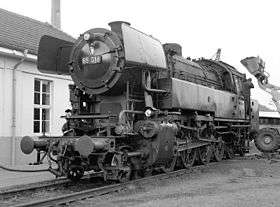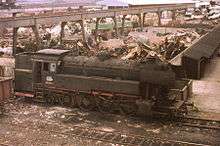DB Class 65
| DB Class 65 | |
|---|---|
 DB Class 65 | |
| Number(s) | DB 65 001–018 |
| Quantity | 18 |
| Manufacturer | Krauss-Maffei |
| Year(s) of manufacture | 1951–1956 |
| Retired | 1966ff. |
| Wheel arrangement | 2-8-4T |
| Axle arrangement | 1′D2′ h2t |
| Length over buffers | 15,475 mm (50 ft 9 1⁄4 in) |
| Service weight | 107.6 tonnes (105.9 long tons; 118.6 short tons) |
| Adhesive weight | 67.6 tonnes (66.5 long tons; 74.5 short tons) |
| Axle load | 16.9 tonnes (16.6 long tons; 18.6 short tons) |
| Top speed | 85 km/h (53 mph) |
| Indicated Power | 1,089 kW (1,481 PS; 1,460 hp) |
| Driving wheel diameter | 1,500 mm (4 ft 11 in) |
| Leading wheel diameter | 850 mm (2 ft 9 1⁄2 in) |
| Trailing wheel diameter | 850 mm (2 ft 9 1⁄2 in) |
| No. of cylinders | Two |
| Cylinder bore | 660 mm (26 in) |
| Piston stroke | 570 mm (22 7⁄16 in) |
| Boiler Overpressure | 14 bar (1.40 MPa; 203 psi) |
| Grate area | 2.67 m2 (28.7 sq ft) |
| Superheater area | 62.90 m2 (677.0 sq ft) |
| Evaporative heating area | 139.93 m2 (1,506.2 sq ft) |
| Water capacity | 14.3 m3 (500 cu ft) or 14,300 litres (3,100 imp gal; 3,800 US gal) |
| Fuel | Coal: 4.8 tonnes (4.7 long tons; 5.3 short tons) |
| Brakes | Knorr brake |
The steam locomotives of DB Class 65 were newly designed, German, passenger train tank locomotives, built for the Deutsche Bundesbahn after the Second World War. They were intended for suburban and commuter trains serving German cities, where they were to replace Classes 78 and 93.5. As a result, they were allocated to the locomotive depots (Bahnbetriebswerke or BW) at Darmstadt, Düsseldorf and Letmathe. Between Düsseldorf and Essen they were even used on early S-Bahn services. And between Limburg/Lahn and Wiesbaden and in the area of Darmstadt they also hauled goods trains.
The firm of Krauss-Maffei initially delivered 13 engines in 1951 and a further 5 from 1955 to 1956. The first engine, with operating number 65 001, was retired as early as 1966.
All the vehicles were given a welded, high-performance boiler. Operating numbers 65 001 - 65 013 were equipped with a surface economizer. Numbers 65 014 - 65 018 were given a mixer preheater. Numbers 65 012 - 65 018 were equipped for push-pull services. So there were three different variants of these two-cylinder, superheated steam engines in service with the Bundesbahn.

Class 65 locomotives proved to be exceptionally reliable engines, but they could not be used universally, because their coal bunkers and water tanks were small. As a result, they could only be used for short-range goods traffic.
Locomotive 65 018 was given a special lightweight drive, which was later used on all the engines. This locomotive is the only representative of its class to have survived in working order and is owned by the Stoom Stichting Nederland society in the Netherlands, having been donated by a German railway museum in 1981. It was retired from Bw Aschaffenburg in 1972, the last one of these attractive locomotives to be paid off.
See also
| Wikimedia Commons has media related to DB Class 65. |